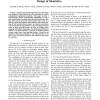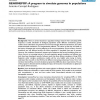1142 search results - page 139 / 229 » Genetic Programming Reconsidered |
134
click to vote
CEC
2010
IEEE
15 years 3 months ago
2010
IEEE
Genetic programming approaches have previously been employed in the literature to evolve heuristics for various combinatorial optimisation problems. This paper presents a hyper-heu...
111
click to vote
BIB
2008
15 years 2 months ago
2008
Short tandem repeats, specifically microsatellites, are widely used genetic markers, associated with human genetic diseases, and play an important role in various regulatory mecha...
BMCBI
2008
15 years 2 months ago
2008
Background: There are several situations in population biology research where simulating DNA sequences is useful. Simulation of biological populations under different evolutionary...
143
click to vote
INFSOF
2008
15 years 2 months ago
2008
This paper introduces an approach to locating dependence structures in a program by searching the space of the powerset of the set of all possible program slices. The paper formul...
GECCO
2005
Springer
15 years 8 months ago
2005
Springer
The C-value Paradox is the name given in biology to the wide variance in and often very large amount of DNA in eukaryotic genomes and the poor correlation between DNA length and p...


